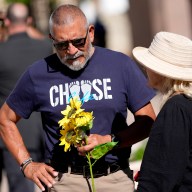Shortly after Jose Lima won $14.5 million playing Lotto 6/49 a year ago, a stranger brought him a gift.
It was a crude, hand-drawn portrait of Lima, mocked up to look like the front page of a newspaper.
“It didn’t look like me. It had lots of hair,” Lima said, rubbing his balding pate.
He wasn’t raised to refuse a gift, so he accepted the picture.
Once it was in Lima’s hands, the stranger asked him for $10,000. Lima returned the picture.
In
the weeks after Lima won, variations of the portrait story played out
again and again – with strangers, friends, customers at the butcher
shop he managed.
After receiving his jackpot, Lima told the press, “I still want to be Joe from the butcher shop.”
That didn’t happen.
Lima was eventually driven from the job he loved. Friendships fractured. His instinct to trust evaporated, replaced by wariness.
He
won his jackpot on March 26, 2008. The next day he met with Sharon
Johnson, manager of the prize centre at the Ontario Lottery and Gaming
Corp., who hands out the cheques. She also delivers a warning. Change
your telephone number, Lima remembers her advising. Get out of town for
a couple of weeks. Let things die down.
At the time, Lima thought
Johnson overcautious. He didn’t bother changing his number. “Now I know
I’m lucky,” he said. “There are lots of Jose Limas in the phone book.”
Lima
is a cherubic, courtly 53-year-old. A wide smile permanently creases
his face. He is the sort of person that respects small gestures. When
he learned that he and the OLG’s Johnson shared a birthday, Lima
surprised her on the date with chocolates.
“We meet a lot of happy people, nice people,” Johnson said. “But you feel really great when someone like him wins.”
As
long-time manager at the O Nosso Talho meat market near Bloor St. and
Dufferin Ave., Lima was already a well-known fixture in the
neighbourhood when he struck it rich. Upon picking up his money, he
announced plans to give something back.
First, Lima handed
$5,000 to each of the 50 employees at O Nosso Talho. A week later he
gave away 30,000 kilos of chicken legs to scores of regulars and
bargain hunters lined up around the block.
It was the sort of
sunny story that reaffirms people’s faith in each other. It was widely
reported. And once the cameras left, reality set in.
The day
after the chicken giveaway, Lima travelled to his native Portugal. Back
in the Azores, he was inundated with surprise visits from distant
relatives. After a brief round of congratulations, their real purpose
became clear: could Jose see his way to giving them a little money?
“Little” meant 50,000 or 100,000 Euros ($80,000-$160,000 Cdn). Lima was
taken aback at the boldness of family he barely knew.
“Ten per cent of people have shame. The other 90? No shame at all,” Lima said.
Lima
began receiving calls from people claiming to be relatives Questioned
closely, they couldn’t provide the right names of aunts or uncles.
Confronted, they vanished.
A week later Lima returned to Toronto,
hoping to resume life at the butcher shop. For nearly 20 years, he had
worked 80-hour weeks managing the store owned by his brother, Julio.
His wife and two children helped out there on Saturdays so they could
spend one day a week together as a family.
But once he was back
behind the counter, the requests for money only intensified. People
would walk in off the street with investment ideas and sad stories.
Hundreds of heart-rending letters poured in. People shot for the stars,
asking Lima for hundreds of thousands of dollars to buy a house or pay
off debts or put a child through school.
“I want to help, but I don’t know these people,” Lima said. “Who is telling the truth? It’s very, very tough to help.”
Ontario
lottery officials attempt to contact jackpot winners six to eight weeks
after their win to see how they are faring. According to that ad hoc
research, 49 per cent of million-plus winners say they have been
solicited for donations. Seventy per cent of that group – roughly 35
per cent of the total – say those requests were “not a problem.”
That wasn’t Lima’s experience.
“It
never stopped,” said his nephew, David, who also works at O Nosso
Talho. “It was becoming a real distraction to the business.”
Lima
gave a few friends a small taste – $1,000 – as a token. As he was
handing one friend the money, the man asked for a $60,000 loan to buy a
second house.
“The money was not even out of my hand, and he
wants more,” Lima said. “I told him, `Okay, let’s go to my lawyer. I’ll
give it to you, but we have to do this the right way.’ He said, `No.’
Now we aren’t friends …” and here Lima leans back and shrugs
exhaustedly. “It’s better to lose the friend than lose the money and then lose the friend.”
Lima
added a new line to his conversation. If someone asked to speak to him
alone, Lima would say, “`We can talk. But if it’s about the money,
forget about it.’ And, sure, we talk for a while and then” – Lima
indicates a big circle with his finger – “it comes back to money.”
By
his count, Lima lost five close friends. People got angry. Stories
began circulating the neighbourhood – he was sick, he had left his
wife, his wife had left him. His sister in Portugal made regular,
panicked phone calls. The rumours had hopped the Atlantic within hours.
“People change,” Lima said. “You don’t change, but people change around you.”
Lima
is still a frugal man, one who quit school and began to work full time
at age 11. He lives in the same Etobicoke house he has owned for 12
years. He drives the same old Chevy. His one concession to wealth was
to buy his wife a “nice” car – a $40,000 GMC truck. He takes vacations,
but only because he suddenly has a lot of spare time.
“This is money for my grandchildren,” Lima said. “And if I want to give it, I give it myself. Nobody takes from me.”
By last August, Lima realized that as long as he was behind the counter at the meat market, people would find him. So he quit.
“(The store) was like his baby. Then he won the lottery and he had to give it up,” said nephew David.
Each
weekday Lima walks 9 kilometres from his house to a café only steps
from the meat market. He has shed 25 pounds. He spends a few hours
drinking black coffee and playing cards. In the evening, his wife picks
him up.
“It’s like going to work,” Lima said.
But it does
afford more protection. Ask for Jose Lima at that cafe and you are met
with a blank stare. Explain that you’ve arranged to meet him there and
a cellphone appears. Lima is summoned on speed dial. Last week he was
nearby, painting an apartment he owned before he won his millions.
He
is still disarmingly warm. He speaks happily about the time he now gets
to spend with a family he missed for most of 20 years.
“Forget about millions. My wife? My kids? They’re worth billions,” Lima said.
He said he does not regret winning: “It was a dream and now all my dreams are done.”














